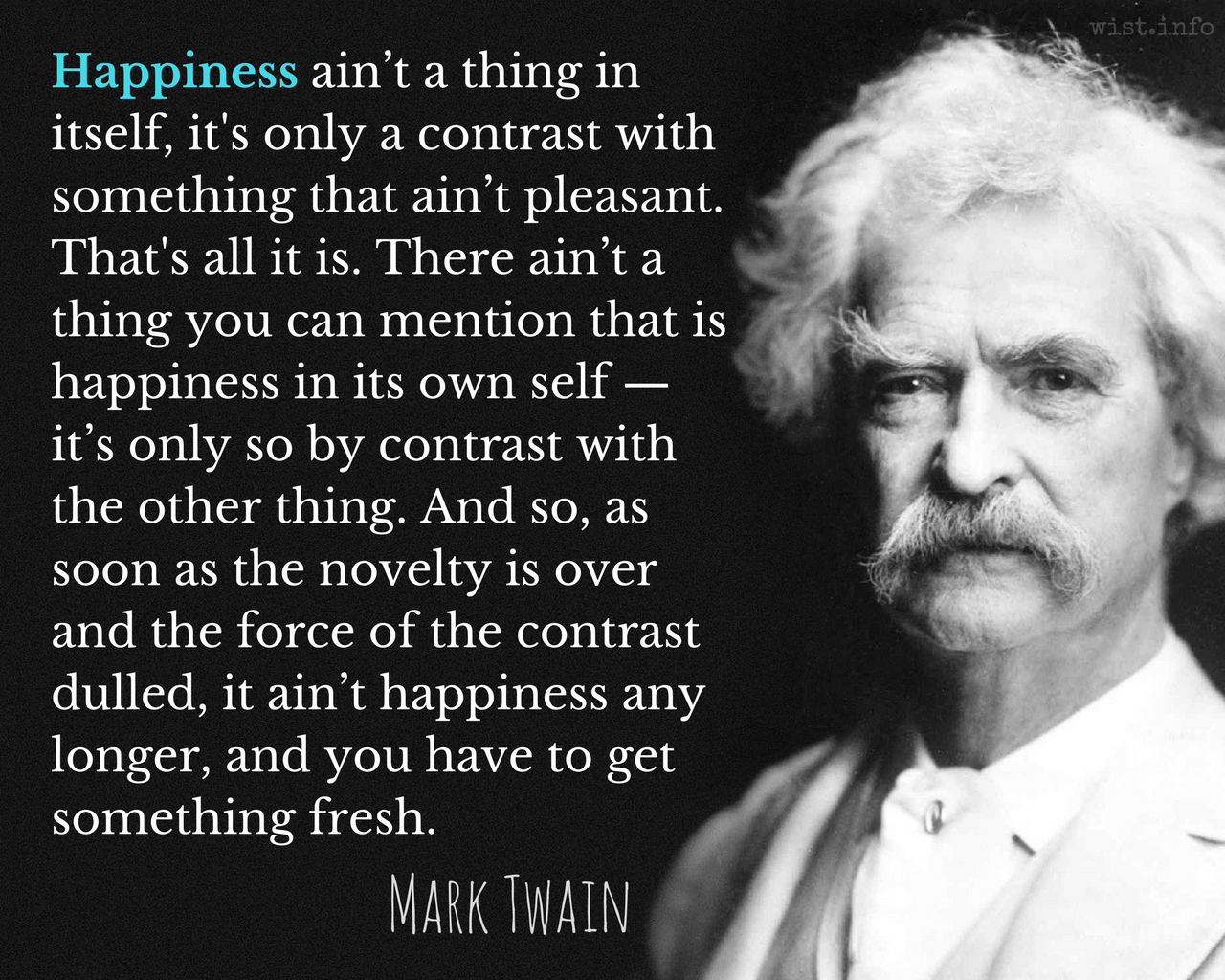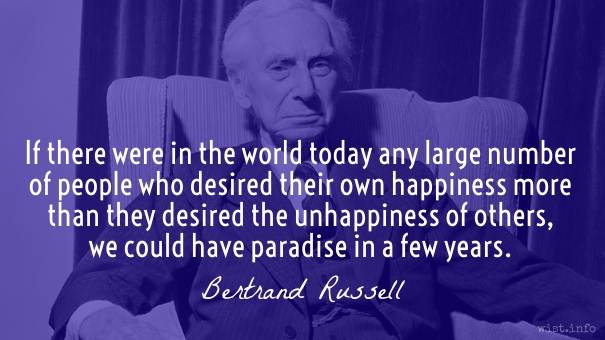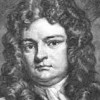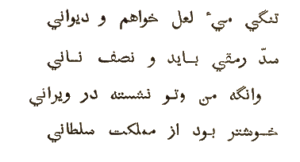I have seen descriptions of Paradise sufficient to make all sensible people give up their hopes of it: some make the happy shades play incessantly on the flute; others condemn them to the torture of an everlasting promenade; while others, who represent them as dreaming on high of their mistresses below, are of opinion that a period of a hundred millions years is not sufficient to overcome a taste for the pains of love.
[J’ai vu des descriptions du paradis, capables d’y faire renoncer tous les gens de bon sens: les uns font jouer sans cesse de la flûte ces ombres heureuses; d’autres les condamnent au supplice de se promener éternellement; d’autres enfin, qui les font rêver là-haut aux maîtresses d’ici-bas, n’ont pas cru que cent millions d’années fussent un terme assez long pour leur ôter le goût de ces inquiétudes amoureuses.]
Charles-Lewis de Secondat, Baron de Montesquieu (1689-1755) French political philosopher
Persian Letters [Lettres Persanes], Letter 126, Rica to *** (1721) [tr. Davidson (1891)]
(Source)
(Source (French)). Alternate translations:
I have seen descriptions of paradise capable of disgusting all men of right understanding: some represent the happy shades incessantly playing on the flute: others condemn them to the punishment of eternally walking about: others again will have those above to be always musing on their mistresses here below, not thinking a hundred millions of years term long enough to make them lose the relish of these amorous inquietudes.
[tr. Ozell (1760 ed.), # 123]
I have read descriptions of Paradise, capable of disgusting every sensible person. The happy shades, according to the fancy of some, are continually playing on the flute, others condemn them to the punishment of eternally walking about; others in short make those above to be always raving after their mistresses here below, not thinking a hundred millions of years long enough to make them get quit of their amorous inquietudes.
[tr. Floyd (1762), # 125]
I have read descriptions of Paradise that would lead all sensible people to renounce it at once: some persons would have the happy shades play eternally on the flute; others condemn them to the torture of a never ending promenade; others who make them dream in heaven of their mistresses on earth, have expressed their belief that even a hundred millions of years would not be long enough to take from them the zest for amatory excitements.
[tr. Betts (1897), # 125]
I have seen descriptions of paradise that would have made any sensible person reject it. Some would have the joyous shades play incessantly upon the flute; others would condemn them to the torture of an eternal promenade; others, who would have them dream on high of their mistresses down below, have assumed that even in a hundred million years they will not lose their taste for such uneasy affairs.
[tr. Healy (1964), # 125]
I have seen descriptions of paradise that would make any man of sense avid going there. Some say the happy spirits in the afterlife engage in an endless bout of flute playing; others that it is an interminable walking about. Others depict them as endlessly dreaming about their mistresses down here, apparently thinking that a hundred million years is too short a time for us to lose our taste for these amorous adventures.
[tr. MacKenzie (2014)]
Quotations about:
paradise
Note not all quotations have been tagged, so Search may find additional quotes on this topic.
Sometimes in a vision, I see a world of happy human beings, all vigorous, all intelligent, none of them oppressing, none of them oppressed. A world of human beings aware that their common interests outweigh those in which they compete, striving toward those really splendid possibilities that the human intellect and the human imagination make possible such a world as I was speaking of can exist if everyone chooses that it should. And if it does exist, if it does come to exist, we shall have a world very much more glorious, very much more splendid, more happy, more full of imagination and happy emotions, than any world that the world has ever known before.
Bertrand Russell (1872-1970) English mathematician and philosopher
Interview by Woodrow Wyatt, BBC TV (1959)
Collected in Bertrand Russell's BBC Interviews (1959) [UK] and Bertrand Russell Speaks His Mind (1960) [US]. Reprinted (abridged) in The Humanist (1982-11/12), and in Russell Society News, #37 (1983-02).
DRUMMOND: As long as the prerequisite for that shining paradise is ignorance, bigotry and hate, I say to hell with it.
Nedrick Young (1914-1968) American screenwriter and actor [pseud. Nathan E. Douglas]
Inherit the Wind, film (1960) [with Harold Jacob Smith]
(Source)
The original 1951 play was written by Jerome Lawrence and Robert E. Lee, but does not include this line, delivered in the film by Spencer Tracy. Young and Smith share the screenwriting credits.
There, all is order and loveliness,
Luxury, calm and voluptuousness.[Là, tout n’est qu’ordre et beauté,
Luxe, calme et volupté.]Charles Baudelaire (1821-1867) French poet, essayist, art critic
Les Fleurs du Mal [The Flowers of Evil], # 49 “L’Invitation au Voyage [Invitation to the Voyage],” ll. 13-14 (1857 ed) [tr. Scott (1909)]
(Source)
Also in the 1861 ed. (#53) and the 1868 ed. (#54). (Source (French)). Alternate translations:
There all is beauty and symmetry,
Pleasure and calm and luxury.
[tr. Squire (1909)]
Where everything is beautiful, rich, quiet, honest; where order is the likeness and the mirror of luxury; where life is fat, and sweet to breathe.
[tr. Symons (1913), prose poem version]
There, restraint and order bless
Luxury and voluptuousness.
[tr. Millay (1936)]
There'll be nothing but beauty, wealth, pleasure,
With all things in order and measure.
[tr. Campbell (1952)]
There all is order and beauty,
Luxury, peace, and pleasure.
[tr. Aggeler (1954)]
All is order there, and elegance,
pleasure, peace, and opulence.
[tr. Howard (1982)]
Everything there is order and beauty, luxury, calm, voluptuousness.
[tr. Scarfe (1986)]
There, all is order and leisure,
Luxury, beauty, and pleasure.
[tr. McGowan (1993)]
There, there is nothing but order and beauty, luxury, calm and sensual pleasure.
[tr. Clark (1995)]
It is a land of perfect peace,
Beauty and joy that never cease.
[tr. Lerner (1999)]
There, there's only order, beauty: abundant, calm, voluptuous.
[tr. Waldrop (2006)]
But when the sun in all his state,
Illumed the eastern skies,
She passed through glory’s morning gate,
And walked in Paradise.
Man is the only animal who does not feel at home in nature, who can feel evicted from paradise, the only animal for whom his own existence is a problem that he has to solve and from which he cannot escape.
Erich Fromm (1900-1980) American psychoanalyst and social philosopher
The Anatomy of Human Destructiveness, ch. 10 (1973)
(Source)
Sometimes elided, "Man is the only animal for whom his own existence is a problem he has to solve."
Happiness ain’t a thing in itself, it’s only a contrast with something that ain’t pleasant. That’s all it is. There ain’t a thing you can mention that is happiness in its own self — it’s only so by contrast with the other thing. And so, as soon as the novelty is over and the force of the contrast dulled, it ain’t happiness any longer, and you have to get something fresh.
If there were in the world today any large number of people who desired their own happiness more than they desired the unhappiness of others, we could have paradise in a few years.
Bertrand Russell (1872-1970) English mathematician and philosopher
Interview by Seth King, New York Times (1961-05-18)
Interview on his 89th Birthday. The article does not presently show up in the NYT archives, but the quotation is mentioned in Newsweek, "Newsmakers" (1961-05-29), and in Think Magazine, "Thoughts" (1961-12).
The wolf also shall dwell with the lamb, and the leopard shall lie down with the kid; and the calf and the young lion and the fatling together; and a little child shall lead them.
The Bible (The Old Testament) (14th - 2nd C BC) Judeo-Christian sacred scripture [Tanakh, Hebrew Bible], incl. the Apocrypha (Deuterocanonicals)
Isaiah 11:6 [KJV (1611)]
(Source)
Alternate translations:
Wolves and sheep will live together in peace,
and leopards will lie down with young goats.
Calves and lion cubs will feed together,
and little children will take care of them.
[GNT (1976)]
The wolf will live with the lamb, the panther lie down with the kid, calf, lion and fat-stock beast together, with a little boy to lead them.
[NJB (1985)]
The wolf shall dwell with the lamb,
The leopard lie down with the kid;
The calf, the beast of prey, and the fatling together,
With a little boy to herd them.
[JPS (1985)]
The wolf shall live with the lamb;
the leopard shall lie down with the kid;
the calf and the lion will feed together,
and a little child shall lead them.
[NRSV (1989 ed.)]
A Book of Verses underneath the Bough,
A Jug of Wine, a Loaf of Bread — and Thou
Beside me singing in the Wilderness —
Oh, Wilderness were Paradise enow.
Omar Khayyám (1048-1123) Persian poet, mathematician, philosopher, astronomer [عمر خیام]
Rubáiyát [رباعیات], Bod. # 149 [tr. FitzGerald, 3rd ed. (1872), # 12]
(Source)
Fitzgerald used the same translation for his 4th and 5th ed.
There are at least two close variants of this quatrain (Bodleian 149 and 153). Both introduce the wine, maybe the bread or meat, some verse, and a love interest. In the first variant, in some cases, the setting is in the wilderness which is turned to a virtual Paradise by the accoutrements; in the second case, the other factors turn the writer's mind away from Paradise itself. In the second variant, these items all brought together are valued more highly than the wealth of the Sultan. Some translators blend these together, others break them out in two (or three!) quatrains. While concordances (especially in the 19th Century) draw connections, they sometimes contradict. I have included them all here, for the reader to discern their own differences.
Alternate translations:
Some ruby wine and a diwan of poems,
A crust of bread to keep the breath in one's body,
And thou and I alone in a desert, --
Were a lot beyond a Sultan's throne.
[tr. Cowell (1858), # 13]
Here with a Loaf of Bread beneath the Bough,
A Flask of Wine, a Book of Verse -- and Thou
Beside me singing in the Wilderness --
And Wilderness is Paradise enow.
[tr. FitzGerald, 1st ed. (1859), # 11]
Here with a little Bread beneath the Bough,
A Flask of Wine, a Book of Verse -- and Thou
Beside me singing in the Wilderness --
Oh, Wilderness were Paradise enow!
[tr. FitzGerald, 2nd Ed (1868), # 12]
In Spring time I love to sit in the meadow with a paramour perfect as a Houri and goodly jar of wine, and though I may be blamed for this, yet hold me lower than a dog if ever I dream of Paradise.
[tr. McCarthy (1888), # 177]
When the hand possesses a loaf of wheaten bread, two measures of wine, and a piece of flesh, when seated with tulip-cheeks in some lonely spot, behold such joy as is not given to all sultans.
[tr. McCarthy (1888), # 398]
Give me a flagon of red wine, a book of verses, a loaf of bread and a little idleness. If with such store I might sit by thy dear side in some lonely place, I should deem myself happier than a king in his kingdom.
[tr. McCarthy (1888), #449]
In the sweet spring a grassy bank I sought
And thither wine and a fair Houri brought;
And, though the people called me graceless dog,
Gave not to Paradise another thought!
[tr. Whinfield (1883), # 84]
Give me a skin of wine, a crust of bread,
A pittance bare, a book of verse to read;
With thee, love, to share my lowly roof,
I would not take the Sultan's realm instead!
[tr. Whinfield (1883), # 452]
A Flask of Wine, a book, a Loaf of Bread, --
To every Care and Worldly Sorrow dead,
I covet not, when thou, oh Love, art near,
The Jeweled Crown upon the Sultan's Head.
[tr. Garner, 1.8 (1888)]
Yes, Loved One, when the Laughing Spring is blowing,
With Thee beside me and the Cup o’erflowing,
I pass the day upon this Waving Meadow,
And dream the while, no thought on Heaven bestowing.
[tr. Garner, 1.20 (1888)]
A flask of red wine, and a volume of song, together --
Half a loaf, -- just enough the ravage of Want to tether:
Such is my wish -- then, thou in the waste with me --
Oh! sweeter were this than a monarch's crown and feather!
[tr. M. K. (1888)]
In the Springtime, biding with one who is houri-fair,
And a flask of wine, if 't is to be had -- somewhere
On the tillage's grassy skirt -- Alack ! though most
May think it a sin, I feel that my heaven is there!
[tr. M. K. (1888)]
A book, a woman, and a flask of wine:
The three make heaven for me; it may be thine
Is some sour place of singing cold and bare --
But then, I never said thy heaven was mine.
[tr. Le Gallienne (1897)]
A book, a flask of wine, a crust of bread,
To every care and worldly sorrow dead,
I covet not when thou, oh, Love, art near,
The jeweled turban on the sultan's head.
[tr. Garner (1898), # 8]
A gugglet of wine and a book of poesy,
The haf of a loaf of bread and a penny fee,
And I in a nook of some ruin seated with thee,
Were better than king on a kingdom's throne to be.
[tr. Payne (1898), # 829]
I desire a little ruby wine and a book of verses,
Just enough to keep me alive, and half a loaf is needful;
And then, that I and thou should sit in a desolate place
Is better than the kingdom of a sultan.
[tr. Heron-Allen (1898), # 149]
If a loaf of wheaten-bread be forthcoming,
a gourd of wine, and a thigh-bone of mutton, and then,
if thou and I be sitting in the wilderness, --
that would be a joy to which no sultan can set bounds.
[tr. Heron-Allen (1898), # 155]
A book of verses underneath the vine,
A loaf of bread, a jug of ruby wine,
And thou beside me, resting in the wild,
Would make the dreary wilderness divine!
[tr. Roe (1906), # 25]
A skin of red wine, book of poesy.
Bread, a half loaf, enough for life give me.
Then sitting in some solitude with thee
Were sweeter than the Sultan's empery!
[tr. Thompson (1906), # 560]
If bread you have made from the grain of wheat,
Two maunds of wine, a mutton joint for meat,
In some nook sitting with fair Tulip-cheeks,
Not every Sultan hath such joy complete!
[tr. Thompson (1906), # 586]
Give me a scroll of verse, a little wine,
With half a loaf to fill thy needs and mine,
And with the desert sand our resting place,
For ne'er a Sultan's kingdom would we pine.
[tr. Talbot (1908), # 149]
Let Fortune but provide me bread of wheat,
A gourd of wine, a bone of mutton sweet,
Then in the desert if we twain might sit,
Joys such as ours no Sultan could defeat.
[tr. Talbot (1908), # 155]
If we get but a loaf of wheaten-bread, a gourd of wine
and a leg of mutton.
and if I and thou be sitting in the wilderness, that
were a treat beyond the powers of most sultans.
[tr. Christensen (1927), # 28]
If you have a loaf made from the marrow of wheat,
Of wine two gallons and of lamb a joint,
And if you are sitting in the wilderness with one whose face is beautiful like the moon.
That would be bliss not attainable by a Sultan.
[tr. Rosen (1928), # 320]
If one could find a loaf of grinded wheat,
And with a gourd of wine and chop of meat
Retires to ruined haunts with Beloved One,
What king can hope to find such joyous treat?
[tr. Tirtha (1941), # 7.131]
The Word suffices and a book of songs,
A crumb will fill this what to earth belongs;
In solitude when I would pore on Tee,
I care no kingdoms, neither thrones nor throngs.
[tr. Tirtha (1941), # 8.131]
Should our day's portion be one mancel loaf,
A haunch of mutton and a gourd of wine
Set for us two alone on the wide plain,
No Sultan's bounty could evoke such joy.
A gourd of red wine and a sheaf of poems --
A bare subsistence, half a loaf, not more --
Supplied us two alone in the free desert:
What Sultan could we envy on his throne?
[tr. Graves & Ali-Shah (1967), # 11-12]
If one may have a loaf of the flower of wheat, a two-maund (jar) of wine, a thigh of mutton, seated with a heart's darling in a ruined place -- that is a pleasure that is not the attainment of any sultan.
[tr. Bowen (1976), # 12a]
If we were seated in a desert place,
Where I alone might gaze upon your face,
These simple victuals would our needs suffice:
A thigh of mutton in a dish of rice;
A loaf of bread of finest wheaten flour;
A flagon tall from which cool wine to pour ...
There, in the day's long leisurely decline,
No Sultan's pleasures could compare with mine.
[tr. Bowen (1976), # 12b]
I need a jug of wine and a book of poetry,
Half a loaf for a bite to eat,
Then you and I, seated in a deserted spot,
Will have more wealth than a Sultan's realm.
[tr. Avery/Heath-Stubbs (1979), # 98]
If chance supplied a loaf of white bread,
Two casks of wine and a leg of mutton,
In the corner of a garden with a tulip-cheeked girl,
There'd be enjoyment no Sultan could outdo.
[tr. Avery/Heath-Stubbs (1979), # 234]
In spring if a houri-like sweetheart
Gives me a cup of wine on the edge of a green cornfield,
Though to the vulgar this would be blasphemy,
If I mentioned any other Paradise, I'd be worse than a dog.
[tr. Ememai (1988), # 160]
Ah, would there were a loaf of bread as fare,
A joint of lamb, a jug of vintage rare,
And you and I in wilderness encamped --
No Sultan's pleasure could with ours compare.
[tr. Saldi (1991), # 16]













